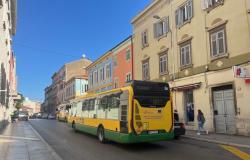The book by the Iranian writer and director will be presented on Wednesday 12 June at the De Giorgi Distillery. The program includes a video testimony/memory for Kaveh Golestan by Vali Mahlouji and the screening of the short film “Fairy lights” by Kaveh Golestan and Ghazi Rabihavi
SAN CESARIO DI LECCE – Wednesday 12 June 2024 at 7.00 pm San Cesario di Lecce, at the De Giorgi Distillerya meeting will be held with the Iranian writer and director Ghazi Rabihavi, of which the volume “The Four Iranian Seasons” will be presented (Musicaos Editore, edited by Benedetta Pati). The meeting is promoted from Astragali Teatro in collaboration with Musicaos Publisher and Association «In Albera» which deals with social promotion and reforestation of Salento. The author, Ghazi Rabihavi, Benedetta Pati (editor of the volume), Fabio Tolledi (artistic director of Astràgali Teatro, President of the Italian Center of the International Theater Institute – ITI UNESCO and Vice President for Europe of the World Theater network) will take part. ITI,), Luciano Pagano (publisher), readings by Roberta Quarta, Simonetta Rotundo, Matteo Mele.
The meeting will begin with a video message by Vali Mahlouji, who will remember the photographic reporter Kaveh Golestan (1950-2003), author of the reportage in the mid-seventies in Iran, from which the photograph that appears on the cover of the volume is taken by Ghazi Rabihavi, and which today is part of the exhibition “Archaeology of the final decade. Recreating the Citadel”, which tells the story of the places, faces and environments of the so-called “Citadel of Shahr-e No”, a former red light district in the city of Tehran.
After the presentation, the short film “Fairy lights” will be screened, filmed by Kaveh Golestan and made with Ghazi Rabihavi, taken from one of the stories featured in “The Four Iranian Seasons” and focused on the female condition when, in countries like Iran, The religious oligarchy took power.
Kaveh Golestan (8 July 1950 – 2 April 2003) was an Iranian photojournalist and artist. In 1988 he took the first photographs of the aftermath of the Halabja chemical attack during the Iran-Iraq war. Working as a freelance photographer, he took the first photographs of the aftermath of the Halabja chemical attack during the Iran-Iraq War. He was awarded the Robert Capa Gold Medal for his work on the 1979 revolution for Time. On 2 April 2003, Golestān was killed at the age of 53 in a landmine explosion while working for the BBC in Kifri, Iraq. He is buried in a cemetery in eastern Tehran.
GHAZI RABIHAVI. Iranian writer, playwright and director, Ghazi Rabihavi was born in Abadan (Iran) in 1956. During Khomeini’s Revolution he moved to Tehran where he worked as a journalist and where he collaborated with Manoocher Deghati and Kaveh Golestan. In 1980 he published the novel Diary of a Soldier, which is why he was arrested and sentenced to death. The eight months he spent in prison cost him a ban from the Iranian Writers’ Association and allowed him to only collectively publish his next novel Hoffreh. He therefore dedicated himself to dramaturgy and cinema, working, among others, with the filmmaker Ebrahim Golestan. In 1994 he was banned from publishing any work and went into exile in London, where he currently lives and works. Among the numerous theater productions we remember Look Europe!, staged in London, New York and Amsterdam and produced by Harold Pinter who took part in it. In 2009, Rabihavi opposed the proposal to establish the Shari’a Courts in Great Britain (an attempt to introduce Islamic law into British courts for family law matters) and staged The Masculine Law, an opera composed by twenty short episodes describing the effects of this legislation on women’s rights. His latest novel The Boys of Love, dealing with the theme of homosexuality, has been translated and published in France, Germany and Egypt, but is still censored in Iran.
The context in which these stories are set is that following the Iranian revolution of the 1980s, which began in 1979 with the fall of the regime of Shah Mohammad Reza Pahlavi and the rise of Ayatollah Khomeini. The Iranian population, led on that occasion by various political and social groups, protested against the authoritarian monarchy, establishing an Islamic Republic based on Shiite religious principles. The new leadership consolidated power through the creation of an Islamic political system, leading to significant social and economic transformations. The revolution led to international tensions, including the American hostage crisis, affecting the geopolitical balance in the region, with consequences that still reverberate on the international political situation today.
War, marginalization, violence, hatred, censorship, are themes that unfortunately always make these stories sadly current, in pages which however are permeated by a great yearning for hope, poetry, love, amazement, courage, from characters who do not lose their humanity and the ability to feel, in the midst of a revolution, living as fugitives or prisoners in their own country, monitored, watched, followed, liable to martyrdom or capital execution. These stories seem to intertwine, with common traits that return, in the desire to live one’s existence freely, in particular with regard to the condition of the female protagonists in relation to the changes that have occurred in Iran.
Life and death intersect here, often the body of the dead and that of the living are equivalent, like that of the martyr who lies unburied, between the mud and his own blood, or that of the elderly man who wants to be buried in a cemetery forbidden, close to his wife, endangering the lives of his children who want to respect this last wish. Together with the crudest realism towards facts that would not have had their own narrative otherwise, there is an ironic and conscious look at censorship and freedom of expression.
“The four Iranian seasons” – Ghazi Rabihavi, Musicaos Editore
edited by Benedetta Pati
Information
Free entry. Reservation recommended: 3892105991 – [email protected] – www.distilleriadegiorgi.eu – www.astragali.it




